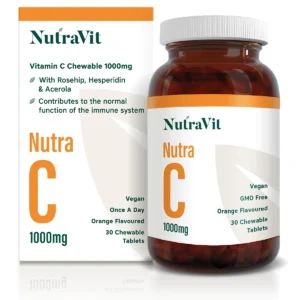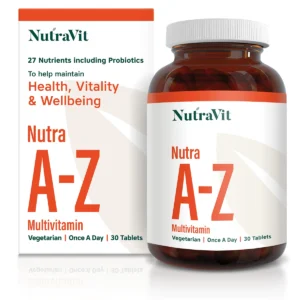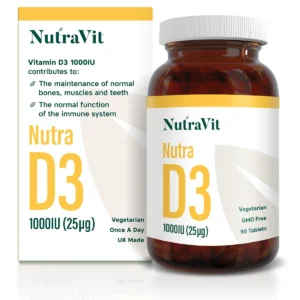We’re at a time where temperatures can drop drastically, setting us up for the cold British winter ahead. Along with the arrival of the cold temperatures, there are more colds and viruses circulating, especially influenza.
Last year, in the week up to Christmas alone, on average, 942 patients each day were admitted to NHS hospitals due to influenza. With growing winter pressures on the NHS and a surge in hospital admissions, it’s wise to do everything in your control to prevent the risk of contracting the flu or colds.
One of the best ways to do this is to focus on a natural and healthy diet. Dive in with us as we uncover the top 5 vitamins and minerals the body needs for flu season.
What is the influenza virus?
Influenza, also known as flu, is a viral infection that can impact the nose, lungs, and throat. There are generally two main types: A and B. If you have the flu, you can usually get better on your own; however, sometimes complications can make you seriously ill.
The most common flu symptoms (NHS) to spot are:
- A sudden high temperature
- Dry cough
- Body aches
- Feeling tired of exhausted
- Headache
- Difficulty sleeping
- Loss of appetite
- Diarrhea
- Tummy pain
- Feeling nauseous
- Diarrhea
While you can get an influenza vaccine to protect yourself from seasonal flu, it isn’t 100% effective. What is in your control is increasing your uptake of vitamins and minerals the body needs for flu.
5 vitamins and minerals the body needs this season
Save yourself money from buying over-the-counter medications for flu and cold treatment by incorporating these vitamins and minerals into your diet:
-
Vitamin C
While it’s not a complete cure, Vitamin C is known to help reduce the frequency and duration of common colds. Vitamin C is also high in antioxidants, which help reduce oxidative stress, supporting the function of your immune system and helping it fight off infections more effectively. You can get vitamin C from:
- Kiwis
- Oranges
- Lemons
- Peppers
- Strawberries
- Blackcurrants
- Broccoli
- Peppers
Pro Tip: If you can’t get enough from food, try taking Nutra-C Chewable or Nutra C-SR as a preventive measure. These high-strength Vitamin C tablets can help protect your body from free radicals, maintaining good immune and overall body health.
2. Vitamin A
Vitamin A plays an important role in supporting your immune health. It’s high in anti-inflammatories, which help regulate your immune response. It also supports the production and function of T and B cells, which help identify and kill certain pathogens. It also helps maintain the structure of the mucous membranes in your respiratory tract, strengthening the first line of defence to trap bacteria, pathogens and viruses like the flu. Foods that contain Vitamin A are:
- Carrots
- Eggs
- Spinach
- Butternut squash
- Mango
- Apricots
Pro Tip: If you don’t think you’re getting enough vitamin A from your diet then try Nutra A-Z. This all rounder multivitamin has vitamin A alongside 27 nutrients including probiotics, folic acid and iron. It’s a fantastic supplement to take every day that supports the function of your immune system, reduces fatigue, supports your body’s defence from challenges and more.
3. Zinc
Zinc is a mineral which provides a lot of benefits and support for flu and cold symptoms. It plays an important role in cell division and growth, wound healing, breaking down nutrients and more. While zinc doesn’t completely eradicate colds and the flu, a lot of research and articles share that it reduces the intensity of symptoms. Steadily adding it to your diet can slowly help minimise the impact of viruses and bacteria on your body. Here are foods that contain zinc:
- Oysters
- Red meat
- Nuts
- Whole grains
- Dairy products
Pro Tip: NutraZinc is a fantastic supplement that can help fight free radicals, help a range of bodily functions and provides full support to your immune system. It also helps maintain the strength of your skin, bone and nails.
4.Vitamin D
In the UK, ,Vitamin D is one vitamin we don’t get enough of in the winter. With its main source being the sun, Vitamin D helps build up immunity and fight off infections like influenza by triggering antiviral responses. Moreover, when vitamin D levels are low in winter, your immune response can be compromised, and you may be at increased risk of infections.
Pro Tip: To keep levels at bay, try Nutra D3. This supplement helps contribute to the normal function of the immune system, helps with bone maintenance, muscle function and teeth health.
Another great supplement you may want to also consider is NutraDefence, it combines three immune boosting vitamins D, C and zinc to protect your immune system.
5. Magnesium
Magnesium plays an important role in supporting your immune health. This mineral is high in anti-inflammatory properties, which can help regulate the immune response. It also helps initiate the production of killer T cells that help fight viruses and pathogens. Many foods are rich in magnesium, such as:
- Seeds
- Nuts
- Avocados
- Dark chocolates
- Whole grains
- Fatty fish
- Legumes

Nutra Mag
Pro Tip: If you’re conscious you aren’t getting enough magnesium from your diet then try Nutra Mag. It’s a high strength tablet which comes with a range of immune boosting vitamins and minerals such as B3, B6, B12, D3,Zinc and Boron.
The bottom line
Overall, coming into contact with the cold and flu in winter time is inevitable. While you can get vaccinated, there are many different and new strains that circulate each year, making it difficult to avoid facing them.
To help minimise the risk of contracting flu and cold symptoms, stay on top of your hygiene, limit your exposure to sick people and focus on a healthy diet. Try to get as many vitamins and minerals as possible from the food you eat. Focus on obtaining vitamin C, vitamin A, zinc, vitamin D and magnesium. If you can’t get enough through your diet, then why don’t you try taking a supplement?
At NutraVit, we have a range of vitamins and minerals manufactured to the highest standards at a state-of-the-art GMP-certified site here in the UK. Browse our range of vitamins and minerals today.
 FREE UK DELIVERY ON ORDERS OVER £20.
FREE UK DELIVERY ON ORDERS OVER £20. WORLDWIDE SHIPPING AVAILABLE
WORLDWIDE SHIPPING AVAILABLE




